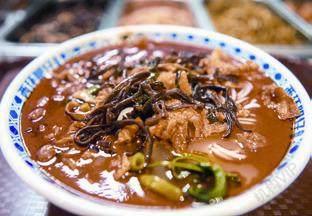The Savory List
By Yuan Yuan

The city of Liuzhou, in Guangxi Zhuang Autonomous Region in south China, is the home of the now nationally famous rice noodle dish, luosifen. The reason for the dishs fame is not only its distinctive flavor, but also the unrivaled efforts the city has put into promoting the dish over the last 10 years.
Luosifen has its origins as an inexpensive street snack sold in Liuzhou in the late 1970s. Liuzhou locals, having a lot of love for both river snails (luosi) and rice noodles (fen), created the dish by dipping the rice noodles in a broth made from stewed river snails, yielding a unique and popular flavor. The creators also made good use of other local specialties by topping the dish with pickled bamboo shoots, tofu skin and fried peanuts.
The pungent and distinctive scent of the noodles, which is said to come from the pickled bamboo shoots, has gradually attracted trendy diners from around the country. Some like to compare luosifen to durian, as both have a pungent odor and a loyal following.
Despite its popularity, for decades this local delicacy remained popular only within Liuzhou. It was in the early 2010s that Liuzhous local government and businesses began to see the potential of luosifen and started to explore possibilities for maximizing its value.
From one bowl to a billion
In 2011, the Liuzhou local government initiated a project to begin opening luosifen restaurants in Beijing. Chen Wei, a luosifen restaurant owner in Liuzhou, opened his first Beijing branch in a bustling area of the city. In contrast to the many small and shabby hole-in-the-wall shops serving the dish in Liuzhou, Chen made a higher investment in design and interior decoration for his Beijing restaurant with the intention of creating a clean and modern image for luosifen.
The appearance of luosifen in the highly acclaimed 2012 food documentary, A Bite of China, gave the snack the push it needed to achieve nationwide fame, which in turn gave Chen the confidence to promote the dish more assertively. His ambition at the time was to open 1,000 branches in Beijing. However, the profits he made with his first restaurant barely covered the high rent he paid in Chinas capital and, finally, he closed the restaurant in 2016.
“Unlike other restaurant chains that serve food made with pre-prepared or semi-prepared ingredients, in those days luosifen couldnt be prepared and packaged in advance. Each bowl of noodles needed to be boiled one after another, which had a big impact on efficiency,” Chen said.

